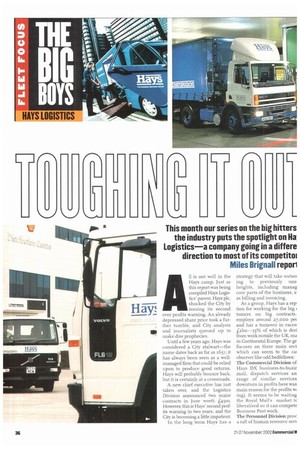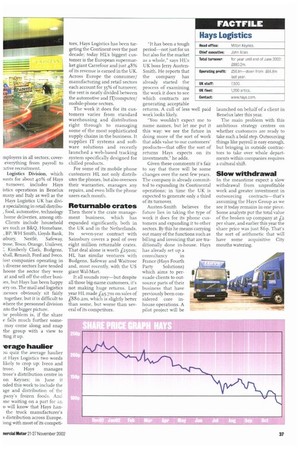This month our series on the big hitters the industry
Page 36

Page 37

If you've noticed an error in this article please click here to report it so we can fix it.
puts the spotlight on Ha Logistics—a company going in a differe direction to most of its competitm Miles Brignall repori
A„ is not well in the Hays camp. Just as this report was being compiled Hays Logistics' parent, Hays plc, shocked the City by issuing its second ever profits warning. An already depressed share price took a further tumble, and City analysts and journalists queued up to make dire prophecies.
Until a few years ago. Hays was considered a City stalwart—the name dates back as far as 1651; it has always been seen as a well. managed firm that could be relied upon to produce good returns. Hays will probably bounce back, but it is certainly at a crossroads.
A new chief executive has just taken over, and the Logistics Division announced two major contracts in June worth L45m. However, this is Hays' second profits warning in two years, and the City is becoming a little impatient.
In the long term Hays has a strategy that will take outsoi ing to previously uns heights, including manag core parts of the business, s. as billing and invoicing.
As a group. Hays has a rep. tion for working for the big tomers on big contracts. employs around 2.7,000 pec and has a turnover in exces: L2bn-35% of which is deni from work outside the UK, ma in Continental Europe. The gr focuses on three main sect which can seem to the cai observer like odd bedfellows: The Commercial Division of Hays DX business-to-busir mail, dispatch services an range of similar services downturn in profits here was main reason for the profits im ing). It seems to be waiting the Royal Mail's market tc liberalised so it can compete Business Post work.
The Personnel Division prov a raft of human resource serv
mployers in all sectors. covereverything from payroll to :utive recruitment.
Logistics Division, which
■ unts for about 40% of Hays turnover, includes Hays [sties operations in Benelux many and Italy as well as the Hays Logistics UK has divis specialising in retail distribu, food, automotive, technology home deliveries, among othClients include household tes such as B&Q, Homebase, , BP, WI-I Smith. Lloyds Bank, isbury, Nestle, Safeway, trose, Tesco, Orange, Unilever, Kimberly Clark, Budgens, xhall, Renault, Ford and Iveco. fost companies operating in diverse sectors have tended hoose the sector they were at and sell off the other busites, but Hays has been happy trry on. The mail and logistics messes obviously sit fairly together. but it is difficult to where the personnel division nto the bigger picture.
he problem is, if the share e falls much further somemay come along and snap the group with a view to -ting it up.
rerage haulier
D u quiz the average haulier at Hays Logistics two words likely to crop up: Iveco and trose. Hays manages trose's distribution centre in on Keynes; in June it nded this work to include the age and distribution of the pany's frozen foods. And me waiting on a part for an o will know that Hays hanthe truck manufacturer's s distribution across Europe. long with most of its competi tors, Hays Logistics has been targeting the Continent over the past decade; today HL's biggest customer is the European supermarket giant Carrefour and just 48% of its revenue is earned in the UK. Across Europe the consumer/ manufacturing and retail sectors each account for 35% of turnover; the rest is neatly divided between the automotive and IT/computer/ mobile-phone sectors.
The work it does for its customers varies from standard warehousing and distribution right through to managing some of the most sophisticated supply chains in the business. It supplies IT systems and software solutions and recently launched a web-based tracking system specifically designed for chilled products.
For some of its mobile phone customers HL not only distributes the phones, but also oversees their warranties, manages any repairs, and even bills the phone users each month.
Returnable crates
Then there's the crate management business, which has expanded significantly. both in the UK and in the Netherlands. Its seven-year contract with Sainsbury covers a pool of over eight million returnable crates. That deal alone is worth f25om; HL has similar ventures with Budgens, Safeway and Waitrose and, most recently, with the US giant Wal-Mart.
It all sounds rosy—but despite all those big-name customers, it's not making huge returns. Last year HL made f45.7m on sales of g80.2m, which is slightly better than some, but worse than several of its competitors. "It has been a tough period—not just for us but also for the market as a whole," says HL's UK boss Jerry AustenSmith. He reports that the company has already started the process of examining the work it does to see which contracts are generating acceptable returns. A cull of less well paid work looks likely.
'You wouldn't expect me to name names, but let me put it this way: we see the future in doing more of the sort of work that adds value to our customers' products—that offer the sort of returns Hays expects on its investments," he adds.
Given these comments it's fair to say that there will be some changes over the next few years. The company is already committed to expanding its Continental operations; in time the UK is expected to generate only a third of its turnover.
Austen-Smith believes the future lies in taking the type of work it does for its phone customers and expanding it to other sectors. By this he means carrying out many of the functions such as billing and invoicing that are traditionally done in-house. Hays has already set up a
UK staff: UK fleet:
consultancy in France (Hays Fourth Party Solutions) which aims to persuade clients to outsource parts of their business that have previously been considered core inhouse operations. A pilot project will be launched on behalf of a client in Benelux later this year.
The main problem with this ambitious strategy centres on whether customers are ready to take such a bold step. Outsourcing things like payroll is easy enough, but bringing in outside contractors to take over whole departments within companies requires a cultural shift.
Slow withdrawal
In the meantime expect a slow withdrawal from unprofitable work and greater investment in outsourcing contracts—that's assuming the Hays Group as we see it today remains in one piece. Some analysts put the total value of the broken up company at £2 per share, and earlier this year the share price was just 86p. That's the sort of arithmetic that will have some acquisitive City mouths watering.




























































































































































